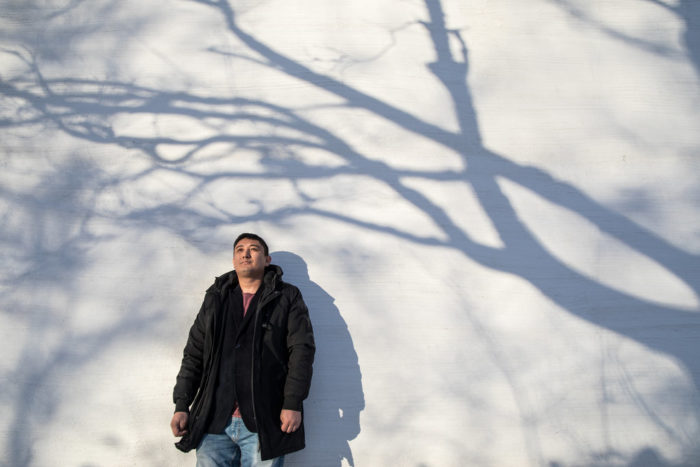‘Show Me That My Father Is Alive.’ China Faces Torrent of Online Pleas.

The New York Times, 17 February 2019
 By Austin Ramzy – Many members of the Uighur ethnic group living in exile are worried that their relatives back home in China are locked up in internment camps — or dead.
By Austin Ramzy – Many members of the Uighur ethnic group living in exile are worried that their relatives back home in China are locked up in internment camps — or dead.
So when China released a video this past week to prove that a prominent Uighur musician had not died in custody as rumored, Uighurs around the world sat up.
“Show me that my father is alive and well!” one wrote on Twitter. “Where are my relatives?” another asked. In one clip, a child held up a photo of her missing father, weeping as she said: “Show his video to us.”
Murat Harri Uyghur, a doctor living in Finland, and a group of fellow activists gave the campaign a hashtag, #MeTooUyghur(#MenmuUyghur in Uighur), and urged others to add their voices to it.
“Now, we want to know, where are millions of #Uyghurs?” the doctor wrote, using an alternate spelling of Uighur. He referred to reports that China is holding a million or more Uighurs, Kazakhs and members of other mostly Muslim Turkic minorities in internment camps in the far western Xinjiang region.
Mr. Uyghur said he and other activists hoped to echo the #MeToo campaign led by survivors of sexual assault and harassment. At first, they were afraid the hashtag would be offensive to women, Mr. Uyghur said by telephone.
“But then we said the Uighurs are also abused,” he said. “As a nation, it is like we were raped.”
We are launching new international movement, please join us! Chinese authority show video, as prof of Mr.Heyt is still alive. Now, we want to know, where are millions of #Uyghurs? Please join #MeTooUyghur campaign! Small act, big impact! pic.twitter.com/coNEr3jjVy
— Halmurat Harri Uyghur (@HalmuratU) February 11, 2019
The social media campaign is part of a nascent effort to collect testimony and maintain a list of detainees — like an expanding wall of missing persons notices — to put pressure on China and demand answers: Who is being held in the sprawling network of camps? Are they alive or dead? What are the conditions like? And where are the children, the elderly and the infirm?

Mr. Uyghur’s parents, seen in the photo with his children, were detained in Chinese camps. His children are with him in Finland.CreditMeeri Koutaniemi for The New York Times
The campaign strikes at the heart of Beijing’s effort to portray the camps as job training facilities, meant to improve detainees’ lives and foster stability in a once-restive region. Former detainees deny that, saying the camps are prisonlike facilities where they were forced to renounce devotion to Islam and praise the ruling Communist Party. In recent months, evidence of a system of forced labor in the camps has emerged.
At a regular news briefing, Hua Chunying, a Foreign Ministry spokeswoman, sought to discredit accounts of abuses reported by the foreign media, saying that they were “made up out of thin air” or that the individuals in question did not exist.
Asked to comment on the #MeTooUyghur campaign, Ms. Hua said: “China has a population of more than one billion. Do we need to send out a video of every one of them?”
The camps have drawn international condemnation, including a rare rebuke from a Muslim-majority country, Turkey, this month. Turkey’s statement said that the well-known Uighur musician Abdurehim Heyit had died in Chinese custody, prompting an official Chinese news service to post a video the next day of Mr. Heyit, who said he was healthy and under investigation.
Within hours, Uighurs had begun posting about their own missing relatives.
The diaspora has not always been so outspoken. Many Uighurs and Kazakhs have feared that speaking out about detained friends and relatives would invite Chinese retaliation against their families.
Uighurs ask China :where are my parents,children and other 3 million Uighurs? pic.twitter.com/NxofWdEY1c
— Tahir imin (@Uighurian) February 12, 2019
Mr. Uyghur, the doctor in Finland, was among them. When his mother was detained in April 2017, followed by his father, he kept silent. But out of desperation, he eventually recorded a video of himself denouncing China for his parents’ plight.
That clip, which he posted on Facebook in May 2018, was a then-rare personal account of the indoctrination program, which by that point had incarcerated at least hundreds of thousands of people.

One of the internment camps in the Xinjiang region of China. There is evidence that the camps are growing in size and number.CreditNg Han Guan/Associated Press
Now, with China showing no sign of curbing the program — and evidence emerging that the camps are growing in size and number — more Uighurs have been going public. Thousands have posted short videos or added names and details to lists of the missing.
“People have started to stand up,” Mr. Uyghur said. “Psychologically, they are suffering. They don’t know what to do, but this might give them hope.”

